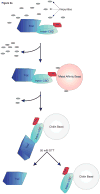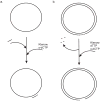Rapid purification of helicase proteins and in vitro analysis of helicase activity
- PMID: 20153831
- PMCID: PMC2892732
- DOI: 10.1016/j.ymeth.2010.02.008
Rapid purification of helicase proteins and in vitro analysis of helicase activity
Abstract
Most processes involving an organism's genetic material, including replication, repair and recombination, require access to single-stranded DNA as a template or reaction intermediate. To disrupt the hydrogen bonds between the two strands in double-stranded DNA, organisms utilize proteins called DNA helicases. DNA helicases use duplex DNA as a substrate to create single-stranded DNA in a reaction that requires ATP hydrolysis. Due to their critical role in cellular function, understanding the reaction catalyzed by helicases is essential to understanding DNA metabolism. Helicases are also important in many disease processes due to their role in DNA maintenance and replication. Here we discuss ways to rapidly purify helicases in sufficient quantity for biochemical analysis. We also briefly discuss potential substrates to use with helicases to establish some of their critical biochemical parameters. Through the use of methods that simplify the study of helicases, our understanding of these essential proteins can be accelerated.
Copyright (c) 2010 Elsevier Inc. All rights reserved.
Figures





References
-
- Abdel-Monem M, Hoffmann-Berling H. Eur J Biochem. 1976;65:431–440. - PubMed
-
- Abdel-Monem M, Durwald H, Hoffmann-Berling H. Eur J Biochem. 1976;65:441–449. - PubMed
-
- Kuhn B, Abdel-Monem M, Krell H, Hoffmann-Berling H. J Biol Chem. 1979;254:11343–11350. - PubMed
-
- Matson SW, Bean DW, George JW. Bioessays. 1994;16:13–22. - PubMed
-
- Lohman TM, Bjornson KP. Annu Rev Biochem. 1996;65:169–214. - PubMed
Publication types
MeSH terms
Substances
Grants and funding
LinkOut - more resources
Full Text Sources

